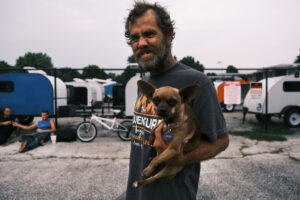When I first moved to Texas in 2006, I spent several months living with my in-laws in Georgetown, a quiet town of about 46,000 people located 30 miles north of Austin. There was a giant house in their neighbourhood that looked different from all the others; apparently the owner had sold a much smaller property in California and built this dream home with the proceeds. Large-scale migration from California to Texas had not yet begun so nobody thought this was a harbinger of social and political change. The concern, rather, was that too many of these “McMansions” would increase property taxes.
But internal migration to Texas did kick in, and then some. Newly released census data shows that between 2020 and 2023, nine of the 10 fastest growing cities in the US with a population of 20,000 or more were in Texas, and Georgetown was on the list having grown by 40.1% during that period. Today, census data puts the population at 93,612. Other towns grew at an even faster clip: Celina — outside Dallas — by 143.2% and Fulshear — outside Houston — by 142.7%. Now the possibility of social and political change seems very real — a popular T-shirt/bumper sticker reads “Don’t Californicate my Texas”. The country singer Creed Fisher (whose oeuvre includes such classics as “Girls with Big Titties”), released a song about the same anxiety: that exiles from the sunshine state will vote for the very same policies that caused the conditions they fled from, changing Texas forever.
Certainly, there are California transplants who intend to do just that. But the overall picture is more complicated than it appears. First, some Californians who move to Texas are conservatives. Second, migration into Texas is from all over the US. And third, Texas has already changed forever.
Georgetown is an excellent case study. When I first visited, it was the seat of archly conservative Williamson County, the Yin to the Yang of Travis County, which was home to all the hippies and nudists and slackers of Austin. The town was everything you’d expect in Texas: a picturesque courthouse, lots of churches, sheriffs with guns on their hips, harsh penalties for marijuana possession and a Walmart as big as an aircraft hangar. I remember eating at a barbecue joint where the staff wore T-shirts that said “Keep Georgetown Normal” — a direct riposte to the famous slogan Keep Austin Weird. Later, the restaurant was converted into a church.
Georgetown was also a bit snobby. It was home to the first university in Texas, a private arts college with a meticulously maintained campus. There were old families with deep roots, such as the Wolfs, whose surname is now attached to a shopping centre and a subdivision built on what was once their land. Then there were the Stumps, who practised law and had an office on the town square: Stump, Stump and Stump. One Stump was very involved in St John’s United Methodist Church, which was founded by Swedish immigrants in 1882. They had a Swedish-language service early on Christmas morning for descendants of the original members. But most impressive of all was that Williamson County was “dry”, meaning restaurants in Georgetown weren’t allowed to serve alcohol.
It all feels like a lost world now. Things began to change with the opening of Sun City, an “active adult community” for people aged 55 and over that brought an influx of retirees. Sun City was my first exposure to that bizarre American style of authoritarianism, whereby free people submit to strict rules about what colour their doors should be, what kind of plants they can grow in their gardens, and so on.
The inhabitants of Sun City wanted places to go in the evening, so it wasn’t long before the whole dry county thing was abolished and upscale restaurants selling alcohol appeared. My wife and I visited one of them for our anniversary. I remember watching a diner with a personal oxygen tank sipping on some wine. The vibe was snooty and stifling, although rumour had it that Sun City was not quite as buttoned up as it seemed to be. I once met a nurse who told me that the “active adult community” was active in more ways than one and had an unusually high rate of STDs. “They have swinger parties,” she said. To be honest, this is so similar to a myth that swirls around a notorious Florida retirement community that I think it’s an urban legend. But it’s a good story.
More McMansions appeared in my in-laws’ neighbourhood, and new subdivisions were added to the town. During the first decade after my arrival the population grew by 20,000. In 2016, when Clinton ran against Trump, I realised that change went far deeper than the liberalisation of alcohol laws. Much to my surprise, the lawn signs in my in-laws’ neighbourhood seemed evenly divided between Trump and Clinton. There was even a “This House Believes…” sign down by the nature trail. But it was during the Black Lives Matter protests in 2020 that I really understood how much Georgetown had changed, when there was a major standoff over the Confederate monument in front of the courthouse. One week I’d visit and there would be a crowd of protestors petitioning for its removal; the next, a motley crew dressed in Confederate uniforms would be there defending it. In the cemetery, little Confederate flags appeared by the graves of soldiers who had fought against the Union.
Ultimately, the monument stood — although efforts to remove it continue. Despite that, the protestors seemed much more at home on the square than the recalcitrant Confederacy cosplayers. Whereas once I used to see a burly man casually strolling about with an assault rifle over his shoulder, I now saw a “woman-owned bookshop” that celebrated inclusion and LGBTQ voices. A fancy confectionary shop opened, as did a winery that also sold artisanal olive oil. It became commonplace to see people weaving in and out of the shops, drinking wine in the open. I couldn’t quite put my finger on why this irritated me so much until my son asked if the powers that be in Georgetown would be quite so relaxed if a group of Mexican day labourers started knocking back Corona beers in front of the courthouse, or if a trucker turned up and started swigging whiskey from a bottle in a brown paper bag.
This question brought the new class politics into sharp focus for me. In the days of the old Georgetown families, the big houses were located on streets that ended in little houses. The working and upper classes lived close to each other and knew each other. Perhaps they went to church together. Fast-forward 20 years and the new wealthy were moving into giant air-conditioned boxes in expensive subdivisions while the working-classes had to move out to Jarrell or Killeen, or squeeze into the new apartments they were building in Georgetown.
But it was only when the shop “Cozy Cannabis” opened just behind the courthouse that I felt it was time to shut Georgetown down until we could figure out exactly what was going on. This was a luxury cannabis-themed wellness shop owned by a “canna-mom” who promised “a curated and safe line of legal hemp products” designed “to uplift the mind, body, and spirit of every person who walks through our doors”. Cozy Cannabis also organised events such as “sound healing”, “chakra balancing” and a “cacao ceremony”. In Austin, fine, go for it, enjoy your vibrations. In California? I wouldn’t blink. But in Georgetown?
To witness so much change in such a short space of time is extremely disorientating. If you can go from a dry county to canna-moms in less than 20 years, then Californication can seem inevitable. In 2020, Williamson County elected a Democrat Sheriff for the first time since the Eighties. At the last general election, Biden narrowly beat Trump.
And yet, I’m not so sure that the arc of history bends toward chakra balancing and White Dudes for Harris Zoom calls. For a start, Georgetown is popular with tourists, so what happens on the square doesn’t represent the locals any more than Piccadilly Circus represents the “real London”. The Democrat Sheriff was elected, at least in part, because the previous one was a reality TV star mired in scandal. The Methodist church in town founded by Swedes disaffiliated from the United Methodists over the liberalisation of their stance on gay marriage and gay bishops. The state representative is a Republican.
But even if Georgetown is fated to be fully Californicated, you don’t have to drive far to enter Trump country. Travel further south, and you will find counties that voted Democrat increasingly leaning Republican. I even recall that when Robert “Beto” O’Rourke ran against Ted Cruz, he polled higher among native Texans than among those born outside the state. All those “new arrivals” may have had a lot to do with keeping Ted Cruz in a job.
The truth is: Texas is always changing. The state was still electing Democrat governors until 1995, while prior to 1961 it had not elected a single Republican to statewide office since Reconstruction. Austin didn’t get weird until the Sixties, and even then, the famous slogan wasn’t coined until the year 2000. Elon Musk is bringing SpaceX to the quiet town of Bastrop and Jeff Bezos is installing a clock under a mountain in West Texas. This is change I can get behind. When I walk around Georgetown, I occasionally feel mild nostalgia for the sleepy town I once knew, but then again, I left for Austin after two months. What makes Texas an interesting place to live is its contradictions — metropolis and country, technology and religion, wealth and poverty — and these are accelerating. So, yes: please don’t Californicate my Texas, but otherwise, let that rough beast slouch forward to be born.
Disclaimer
Some of the posts we share are controversial and we do not necessarily agree with them in the whole extend. Sometimes we agree with the content or part of it but we do not agree with the narration or language. Nevertheless we find them somehow interesting, valuable and/or informative or we share them, because we strongly believe in freedom of speech, free press and journalism. We strongly encourage you to have a critical approach to all the content, do your own research and analysis to build your own opinion.
We would be glad to have your feedback.
Source: UnHerd Read the original article here: https://unherd.com/



